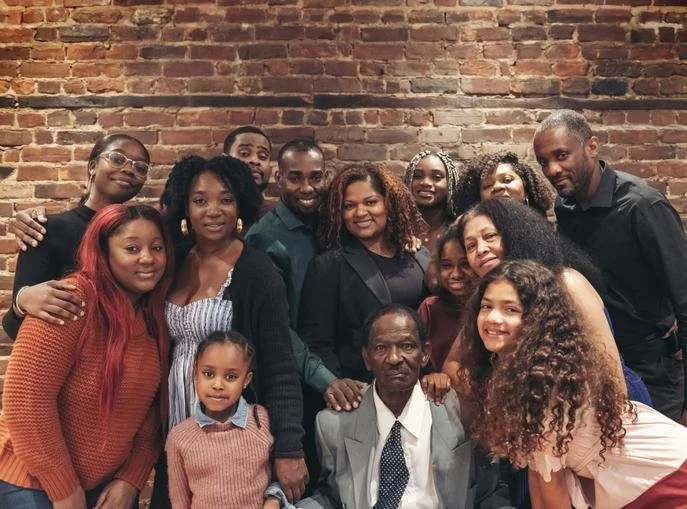“That’s My Cousin”: The Power of Cousin Bonds in the Black Community
In the Black community, cousin relationships go beyond bloodlines, serving as lifelong bonds of friendship, support, and shared cultural identity that shape our earliest memories and hold families together. We discuss it here!
Photo Credit: lisegagne via iStockPhoto.com
By: Jamila Gomez
In the Black community, “cousin” doesn’t just mean your mama’s sister’s kid. It’s deeper than blood. It’s a bond, a lifeline, a whole experience. For so many of us, cousins are our first best friends, our first partners-in-crime, and sometimes the only people who understand the full flavor of what we’re going through. In a world that often tries to break us down, cousin relationships build us up.
Growing up, cousins were the ones we sat at the kiddie table with during Thanksgiving, sneaking extra rolls and giggling through family gossip. They were the ones we shared rooms with during summer breaks, staying up late talking about everything from cartoons to crushes. Cousins helped us learn how to roast, how to play spades, how to braid hair, how to defend ourselves — and how to laugh through pain. That bond doesn’t fade with time. If anything, it gets stronger.
And let’s be real: in many Black families, the cousin network is what holds the whole structure together. We may not always come from traditional nuclear homes, but our families are rich with aunties, uncles, Big Mamas, and cousins who step up, show out, and show love. Your cousin might’ve been your babysitter, your ride to school, your first call after a breakup. They’re your people — your tribe — when the world gets cold.
Cousins often grow up like siblings, especially in households where resources were tight and love had to stretch wide. That closeness builds a unique understanding, an unspoken language that even your closest friends might not get. You share memories, music, inside jokes, and sometimes trauma. But the beauty is in how cousins help you carry it — laughing, praying, healing together.
In today’s world, where everything moves fast and people feel more disconnected than ever, those cousin ties are sacred. They remind us where we come from. They keep us grounded. And for the next generation, it’s up to us to keep that spirit alive — making sure our kids know their cousins, grow with them, and love them like we did.
So when we say, “That’s my cousin,” it’s not just a label. It’s pride. It’s history. It’s love.
Hold your cousins close. Call them. Check on them. Celebrate them. Because in this community, cousin love is family love — and family is everything.
YOU MAY ALSO BE INTERESTED IN:
SHARE TO SOCIAL MEDIA
Practicing Gratitude: A Radical Act of Joy
Practicing gratitude as a Black person is a revolutionary act of joy, resilience, and healing that honors our ancestors, celebrates our culture, and empowers us to thrive despite systemic challenges. We discuss it here!
Photo Credit: Tassil via iStockPhoto.com
By: Jamila Gomez
Being Black in this world is a unique experience—one filled with beauty, resilience, and deep cultural richness, but also with challenges that can be exhausting. Every day, we navigate spaces that weren’t always designed for us, carry generational struggles, and face both overt and subtle forms of discrimination. Yet, despite all of that, we continue to create, thrive, and love. And one of the most powerful ways we can protect our joy is through the practice of gratitude.
Gratitude isn’t about ignoring struggles or pretending oppression doesn’t exist. It’s about recognizing our power, our community, and the blessings that sustain us. It’s about reclaiming our joy in a world that often tries to dim our light.
Gratitude as Resistance
There’s something revolutionary about choosing to see the good in your life when society constantly reminds you of its hardships. When we take time to acknowledge what we’re grateful for—our ancestors’ sacrifices, our culture’s resilience, the love we share with our people—we are resisting narratives that tell us we should always be struggling.
Black joy is an act of defiance. Gratitude strengthens that joy by reminding us that, despite what history and systems have tried to do, we are still here. We are still creating, still innovating, still loving, still pushing forward.
Finding Gratitude in the Everyday
Practicing gratitude doesn’t have to be complicated. It can be as simple as taking a few minutes in the morning to reflect on what you appreciate, journaling about small wins, or even telling your people how much they mean to you. Here are some ways to integrate gratitude into your daily life:
1. Honor Your Ancestors – Take a moment to reflect on those who came before you. Whether through prayer, storytelling, or simply acknowledging their sacrifices, expressing gratitude for their resilience is a powerful way to stay grounded.
2. Celebrate Black Creativity – Be grateful for the music, art, literature, and innovation that Black people have contributed to the world. Whether it’s a song that lifts your spirit or a book that inspires you, take time to appreciate our cultural genius.
3. Thank Your Community – From family and friends to mentors and strangers who support you, recognize the people who show up for you. Gratitude strengthens our bonds and reminds us that we’re not alone.
4. Appreciate Your Own Growth – You’ve survived things that were meant to break you. Give yourself credit. Express gratitude for your strength, your growth, and the lessons you’ve learned.
Gratitude Keeps Us Whole
Practicing gratitude doesn’t mean ignoring reality. It means choosing to see the beauty in the midst of struggle, to uplift ourselves, and to keep our spirits intact. In a world that often tries to wear us down, gratitude is a tool for survival, healing, and joy. And that, in itself, is revolutionary.
YOU MAY ALSO BE INTERESTED IN:
SHARE TO SOCIAL MEDIA
Honoring Ourselves: Celebrating Black History in 2025 and Beyond
Celebrating Black history daily through storytelling, economic empowerment, political engagement, mental health, and Black joy is essential to our resilience. We discuss it here!
Photo Credit: yurakrasil via Adobe Stock
By: Jamila Gomez
In the face of ongoing efforts to erase Black history from textbooks, public discourse, and policy, it is more important than ever for Black people to actively celebrate themselves—not just in February, but every single day. Black history is American history, and despite the challenges posed by the current political climate, we must continue to uplift our stories, honor our ancestors, and celebrate our contributions to society. Here’s how we can do just that in 2025 and for the next four years.
1. Control the Narrative
If they won’t teach our history, we will. Invest time in learning and sharing Black history through books, documentaries, podcasts, and oral storytelling. Read works by Black scholars like Carter G. Woodson, bell hooks, and Ibram X. Kendi. Start community book clubs or host teach-ins at churches, barbershops, and online spaces to educate one another.
2. Support Black-Owned Businesses
Economic empowerment is a revolutionary act. Make a conscious effort to support Black entrepreneurs, from restaurants and bookstores to fashion designers and tech startups. Apps like WeBuyBlack and Official Black Wall Street can help you find businesses that deserve your dollars.
3. Elevate Black Art and Culture
From the Harlem Renaissance to Afrofuturism, Black artistry has always been a vehicle for resistance and joy. Attend Black theater productions, concerts, and museum exhibits. Share and celebrate Black literature, film, and music on social media. Even hosting a movie night with films like The Woman King, Black Panther, or Selma is a way to affirm our stories.
4. Get Politically Engaged
Attempts to erase Black history are deeply tied to efforts to suppress Black political power. Stay informed about policies that affect Black communities and vote in every election. Support grassroots organizations fighting for racial justice, and consider running for local office or joining advocacy groups that challenge harmful policies.
5. Prioritize Black Mental Health and Wellness
Resistance is exhausting, but self-care is revolutionary. Whether it’s therapy, yoga, meditation, or simply resting without guilt, taking care of yourself is vital. Follow Black wellness advocates and engage in practices that nourish your body and mind.
6. Teach the Next Generation
If they’re trying to keep Black history out of schools, we must ensure our children still learn it. Create home libraries filled with Black literature, enroll them in programs like Freedom Schools, and teach them about their heritage with pride.
7. Celebrate Each Other Daily
Black joy is resistance. Celebrate birthdays, achievements, and everyday moments with intentional love. Show appreciation for the people in your life, mentor young Black professionals, and support one another unapologetically.
No matter how hard they try to erase us, we are still here—thriving, creating, and shaping the future. Black History Month is every day, and our celebration is a testament to our resilience and power.
YOU MAY ALSO BE INTERESTED IN:
SHARE TO SOCIAL MEDIA
Black Women Deserve Grace, Not Criticism
Black women face exhausting double standards in appearance, behavior, and cultural expression, highlighting society's need to dismantle biases and celebrate authenticity. We discuss it here!
Photo Credit: Rawpixel via iStockPhoto.com
By: Jamila Gomez
Black women often endure a unique and exhausting double standard in how their actions, appearance, and behavior are judged compared to women of other races. Despite their resilience and contributions to culture, society, and history, they are frequently ridiculed for things that are celebrated or overlooked when displayed by others.
One of the most glaring examples of this double standard lies in the policing of Black women’s physical appearance. Hairstyles like braids, afros, or locs, which are deeply rooted in Black culture, are often labeled as “unprofessional” or “unkempt” in corporate settings. Meanwhile, these same styles, when adopted by non-Black women, are praised as “edgy” or “trendy.” Similarly, Black women are criticized for their naturally curvier bodies or voluptuous figures, often labeled as “too sexual” or “inappropriate.” Yet, when others undergo cosmetic procedures to mimic these features, it’s deemed desirable and aspirational.
Black women’s assertiveness is also subject to an unfair lens. When they speak up for themselves or express strong opinions, they are often branded as “angry” or “aggressive.” This harmful stereotype of the “angry Black woman” minimizes their voices, making them hesitant to advocate for themselves in professional or personal settings. In contrast, women of other races who exhibit the same assertiveness are more likely to be seen as confident and empowered.
Even in parenting, Black women face harsher judgment. Single Black mothers are disproportionately stigmatized and blamed for societal issues, despite many demonstrating incredible strength and resourcefulness. Conversely, single mothers from other backgrounds often receive sympathy and support, with their struggles seen as individual challenges rather than moral failings.
Additionally, Black women are frequently ridiculed for their cultural expressions, from their vernacular to their style. Terms like “ghetto” are used to demean behaviors or aesthetics that are intrinsic to Black communities, only for those same traits to become celebrated when co-opted by others.
This constant scrutiny creates a societal burden that forces Black women to overperform in nearly every aspect of life just to be granted basic respect. While society has made progress in recognizing these disparities, there is still a long way to go in dismantling the biases that perpetuate these double standards. Black women deserve to live authentically, without fear of judgment for simply being themselves.
YOU MAY ALSO BE INTERESTED IN:
SHARE TO SOCIAL MEDIA
Black Joy as Resistance: Embracing Happiness Despite Adversity
Black joy serves as a powerful act of resistance, celebrating the resilience and vibrancy of Black culture while countering systemic oppression. We discuss it here!
Photo Credit: PeopleImages via iStockPhoto.com
By: Jamila Gomez
Black joy is a powerful act of resistance, a deliberate choice to experience happiness in the face of systemic oppression, discrimination, and societal challenges. Historically, Black communities have been marginalized and subjected to systemic inequities, and while the narratives often focus on struggle, survival, and resilience, Black joy brings a transformative dimension to the fight for justice and equity. This joy is not merely about momentary happiness but is a profound assertion of humanity, dignity, and self-worth.
At its core, Black joy resists the notion that pain and trauma should define the Black experience. Throughout history, Black people have found ways to celebrate life despite adversity. Whether through music, dance, food, spirituality, or storytelling, Black joy has always been interwoven with culture and identity. From the rhythms of jazz, soul, and hip-hop to the laughter shared at family gatherings and the joy expressed in Black art, each act of joy is a reminder of the richness of Black culture and heritage. These expressions challenge limiting narratives and reinforce a broader, more authentic view of what it means to live and thrive as a Black person.
Black joy is also an antidote to oppression, a way of reclaiming agency in a world that often tries to strip it away. Rather than passively enduring hardship, embracing joy disrupts narratives of victimhood and instead cultivates strength and resilience. It is a way of saying, “We will not let the weight of injustice rob us of our humanity.” This joyful resistance is evident in the celebration of Blackness, the appreciation of shared history, and the embracing of community. By choosing to revel in the beauty of Black life, Black communities resist systems that have attempted to devalue and marginalize them.
Furthermore, Black joy can create space for healing, community, and solidarity. It allows Black individuals to affirm their identities, celebrate each other’s successes, and draw strength from shared experiences. This joy is contagious, spreading a message that Black lives are not defined solely by struggle but are filled with love, laughter, and triumphs.
In embracing Black joy as resistance, Black communities refuse to be solely defined by their struggles. Instead, they assert a powerful, enduring message: that Black life, in all its beauty and vibrancy, is worth celebrating. Black joy is a testament to the resilience and richness of Black culture, a radiant light that continues to shine, undeterred by adversity.















